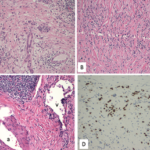The primary end point was time to first treated adjudicated IgG4-RD flare. Secondary end points were annualized flare rate; flare-free, treatment-free remission; treatment-free complete remission; and flare-free, corticosteroidfree complete remission.
In addition to finding that inebilizumab reduced the risk of symptoms by 87%, compared with placebo, for IgG4-RD, researchers found that 40 patients (59.7%) in the placebo group experienced one or more flares, while only seven (10%) in the inebilizumab group experienced at least one flare.
The annualized flare rate was 0.10 for 68 patients on inebilizumab vs. 0.17 for the 67 patients who received placebo. More participants in the inebilizumab group (39) than in the placebo group (15) had flare-free, treatment-free complete remission. Forty inebilizumab patients had glucocorticoid-free complete remission vs. 15 placebo patients.
Participants who received inebilizumab required lower cumulative glucocorticoid exposure to induce remission and maintain disease control during the treatment period than participants who received placebo.
The number of participants who had at least one adverse event during the treatment period was similar in the two groups—66 participants in the inebilizumab group, or 97%, and 66 participants in the placebo group, or 98%.
However, participants on inebilizumab had more serious adverse events of grade 3 or higher that required a medical intervention or significantly disrupted daily life. Grade 3 adverse events occurred in 12 participants, or 18%, in the inebilizumab group and eight participants, or 12%, in the placebo group. Serious adverse events occurred in 12 inebilizumab participants (18%) and six placebo participants (9%), respectively. No single participant experienced more than one serious adverse event.
Adverse events that occurred in more than 10% of participants in the inebilizumab group included COVID-19 among 16, or 24%, of participants. Other adverse events among the inebilizumab group were lymphopenia in 11 participants, or 16%, and urinary tract infection in eight participants, or 12%. Lymphopenia was the most common adverse event of special interest observed in both the inebilizumab and placebo groups. Other infections reported by patients who received inebilizumab were urinary tract infection, nasopharyngitis, upper respiratory tract infection and influenza.
The researchers noted their trial’s limitations. They include its modest size and the low number of participants with previous IgG4-RD treatment. However, the researchers write that they noted no reason to suspect that previous treatment affected trial outcomes. Also, the study population’s median disease duration was relatively short, 3.6 years, among 54% of the participants with recurrent disease at baseline. Because study criteria included history of involvement of at least two organs, some patients with IgG4-RD in just one organ were potentially excluded, the researchers add.


